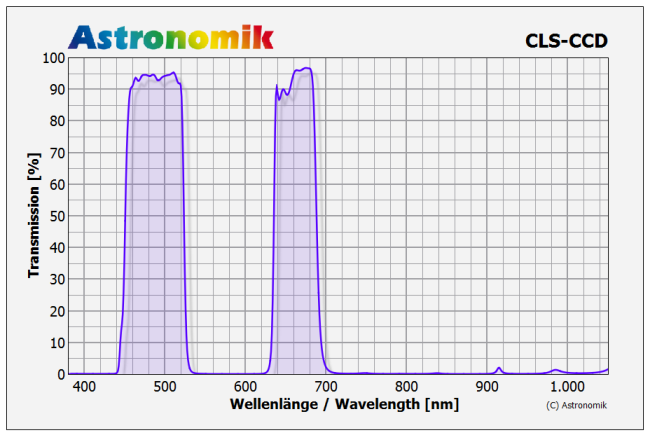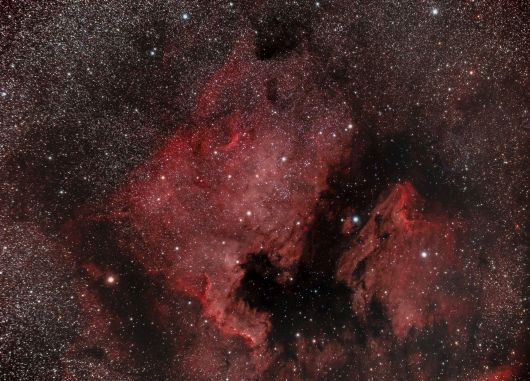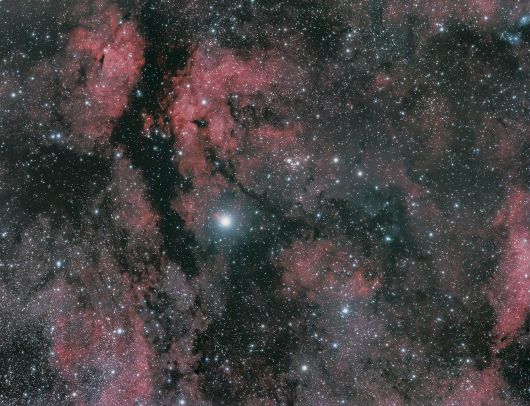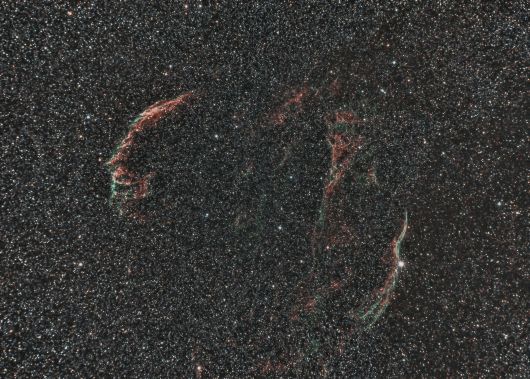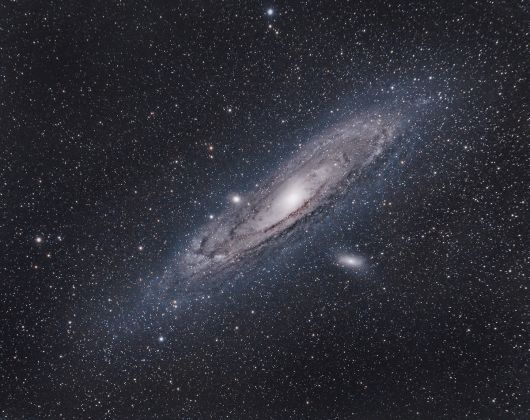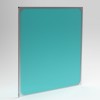- Astronomik Lunar calendar for 2024
The Astronomik calendar of the Lunar phases in 2024 is ready.
- Chistmastime and New Year 2023-2024
We wish you a merry Chirstmastime and a happy and healthy 2024...
- Astronomik Lunar calendar for 2023
The Astronomik calendar of the Lunar phases in 2023 is ready.
- Chistmastime and New Year 2022-2023
We wish you a merry Chirstmastime and a happy and healthy 2023...
- Shipping methods
Shipping as registred good shipment is no longer available
- How to observe planetary nebulae
A very nice introduction to observing planetary nebulas written by Owen Brazell
Astronomik CLS-CCD Filter
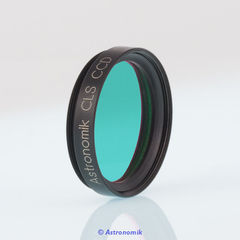
Click the image for full resolution
The Astronomik CLS CCD is suitable under light-polluted skies for DSLR Cameras, which have been remodeled for astronomical use. The filter enhances the contrast between all deep-sky objects and the background.The CLS-CCD Filter enhances the contrast between astronomical objects and the background. Due to the wider transmission curve compared to UHC filters, a greater amount of light will pass the filter. Stars will be less dimmed. This filter has been optimized to block as much spurious light as possible and simultaneously provide the best performance for 'useful' light. A good filter for DSLR-, CCD- and film b/w-photography as well as observation of deep-sky-objects with telescopes or photo lenses of all aperture f/2 and above.
30s exposures with JPEG data directly out of the camera without any further processing. When the mouse is moved over the image the image with the Astronomik CLS is shown. (Canon EOS M3 MC-modified, ISO 1600, Walimex 12/2.0)
If you wonder what to expect from the CLS, you might want to watch this video from Kamil Pekala. The CLS-CCD is very simmilar!
Main use
The filter blocks completely emission lines of artificial light sources like streetlights (e.g. sodium- and mercury-vapor) as well as the airglow. All 'important' emission lines as well as the spectral range of the night-adapted eye are beeing passed. The supplementary IR-blocking layer allows the use for DSLR- and Webcams without an integrated IR-block filter.
Other uses
- Easier resolution of Double Stars.
- With the EOS-Clip model, photography with DSLR cameras is feasible even unter extreme light-polluting conditions without shifting the white balance.
- The 1,25" and 2" socket models can be used for observations from light-polluted areas.
- If you plan to create color images from emission line data, our CLS-CCD filter is a great choice for the Luminance channel
Alternatives
CLS: For cameras with an integrated IR-filter or for visual observation.
more information about the photographic Astronomik filters
How to read the chart
The major emission lines of artifical light pollution:
| Hg 435,8nm | Hg 546,1nm | Hg 577,0nm | Hg 578,1nm |
| Na 589,0nm | Na 589,6nm | Na 615,4nm | Na 616,1nm |
The major emission lines of nebulas:
H-β 486,1nm | OIII 495,9nm | OIII 500,7nm | H-α 656,3nm
- The horizontal axis is the Wavelength in Nanometers (nm). 400nm is deep blue, at 520nm the human eye senses green and at 600nm red. At 656nm is the famous "H-Alpha" emission line of hydrogen.
- The transmission in % is plotted on the vertical axis.
- The red line shows the transmission of the filter.
- Visual filters: The grey line in the background shows the relative sensitivity of the human eye at night. The maximum is at ~510nm and drops to longer and shorter wavelengths. You can easily see, that you can´t see anything of the H-alpha line at night (even if you can during daylight!) The sensitivity at 656nm is 0% at night!
- Photographic filters: The grey line in the background shows the sensitivity of a typical CCD sensor.
- The most important artifical emission lines are shown in orange. The artifical light pollution is dominated by see mercury (Hg) and sodium (Na), which are used in nearly all streetlights.
- The most important emission lines from nebulas are shown in green. The most important lines are from ionized Hydrogen (H-alpha and H-beta) and double ionized oyxgen (OIII).
The major emission lines of artifical light pollution:
| Hg 435,8nm | Hg 546,1nm | Hg 577,0nm | Hg 578,1nm |
| Na 589,0nm | Na 589,6nm | Na 615,4nm | Na 616,1nm |
The major emission lines of nebulas:
H-β 486,1nm | OIII 495,9nm | OIII 500,7nm | H-α 656,3nm
Suitability
- Visual observation (dark skies): Good, to reduce light pollution by mercury-vapour lamps (streetlight)
- Visual observation (urban skies): Reasonable, an UHC-E or UHC filter is more suitable
- Film photography: Very good, colour balance is near perfect
- CCD photography: Very good, optimized rejection of light pollution
- DSLR photography (original): Good, colour balance shifted but contrast enhanced
- DSLR photography (astro modified): Very good, colour balance is near perfect
- DSLR photography (MC modified): Very good, colour balance is near perfect
- Webcam / Video (Planets): Unsuitable
- Webcam / Video (Deep Sky): Very good, if light pollution is a big problem
Technical Data
- 95% transmission at 486nm (H-beta)
- 95% transmission at 496nm (OIII)
- 95% transmission at 501nm (OIII)
- 97% transmission at 656nm (H-alpha)
- pass from 450 to 520nm and from 640 to 690nm
- Parfocal with other Astronomik filters
- Glass thickness: 1mm
- Completely resistant against high humidity, scratches and aging effects
- Diffraction limited, the filter will not reduce the optical performance of your telescope!
- Astronomik filters are delivered in a high-quality, long lasting, filter box
- Since 2008 we do ship filters with a completely new design. Any kind of halo or strange reflection is a matter of past
Gallery with images made using our Astronomik Filter:
Please visit our gallery for more technical information!
Mario Spénard: "I want to thank you for your magnificent CLS-CCD. I am using it with a standard unmodified Nikon D610 in a very light polluted area with some really nice result."
The filter is available in the following sizes
Filter displayed products below by their features
- Remove This Item Size: 50x50mm, ungefasst

 Deutsch
Deutsch English
English